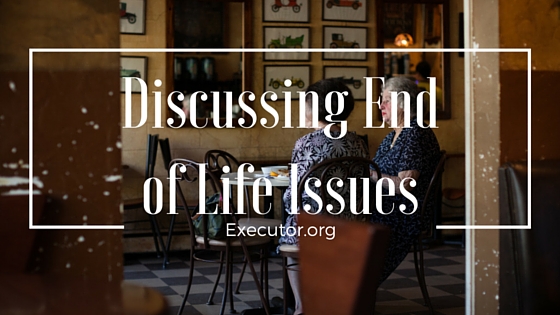
What Your Aging Parent Isn’t Telling You – I Want to Discuss End-of-Life Issues
This “I Want to Discuss End of Life Issues” by Executor.org also appeared in the Huffington Post.
Most of us live our lives as if we will be alive tomorrow, and for many years to come. Of course, that’s not always the reality and at some point – hopefully, at least – we stop and plan for death.
If you are the child of an aging parent, you might expect they have already tackled the weighty issues surrounding estate planning and end-of-life matters. You trust they’ve drawn up a will, created a living will to guide their medical care if they become unable to communicate, and maybe even taken the time to make funeral plans. Or perhaps you aren’t sure if they have finalized their plans, but assume they have preferences and opinions that can be discussed in detail another day.
That all said, it is important to consider that your parent may very well want to discuss these matters with you sooner rather than later. But since much of the work of being a parent is to trying to protect your child – even when they are an adult – from sadness and suffering, your parent might be reluctant to bring up matters related to them dying because they think it will make you uncomfortable.
In this series by Executor.org, we look at issues and problems that could be happening in your parent’s life that they are not telling you about and offer solutions to help manage these situations. As parents age, communication matters more than ever, and your ability to keep your parents talking as they encounter new problems will be critical as your role in their lives evolves.
I Want to Discuss End-of-Life Issues
It can be very difficult to bring up death, especially with a loved one you don’t want to imagine losing. But in many cases, by opening the door to this discussion you can give your parent some peace of mind. They’ll know they were able to help you understand their wishes and spare you the stress of having to make these tough decisions on your own. And they’ll take comfort from knowing their wishes will be followed. The reality is that you’ll be very appreciative after they pass away to have had the opportunity to ask them the questions that will help you best understand their estate and their wishes.
Here’s three tips to help you determine if it’s the right time to discuss end-of-life issues with your parent:
1. Look for cues.
A friend recently shared that every time she went to visit her dad it seemed like he mentioned something about planning his estate. One day it was that he called his lawyer to see if he should update his will, the next it was that he had created an Excel sheet on the computer to list his assets and insurance policies. During a phone call a couple months later, he mentioned he was looking into paying for his funeral in advance. For her part, she admitted she usually chose to change the subject quickly, not wanting to dwell on such a depressing topic. And he, following her cue, didn’t push it. After she finally realized he very much wanted to talk about end-of-life issues, she asked him if that was the case. And he jumped at the opportunity and took great comfort in having her fully aware of his plans. So if your parent is casually mentioning these topics, ask if they want to set a time to go over their will, wishes regarding medical care, and other estate planning matters.
2. Pick a logical time to talk.
This conversation obviously can be a difficult one and ideally you should leave ample time to cover everything your parent wants to cover. Pick a place where you can talk uninterrupted and not be rushed. And consider the best time for your parent, not necessarily yourself. For example, as we age and cope with illness, many of us will find we feel mentally sharper in the morning. So follow your parent’s lead and let them set the time. Also, since personal finances and other private topics will be on the agenda, make sure the discussion will occur out of earshot of those who have no need to know the details. Keep in mind that you don’t need to make a great production out of setting a time or location to talk. Ultimately, the most important thing is to have this discussion as soon as possible. Illness and accidents can strike suddenly and unexpectedly, and learning your parent’s wishes while they are alive and feeling well will be easier than relying on paperwork or risking the possibility that they become too ill to convey their wishes.
3. Remember it’s about their wishes, not yours.
Most of us will have preferences when it comes to things such as end-of-life medical care, funeral plans, and who inherits our assets. It is important to remember that your parent’s wishes might be very different than yours. You might be surprised to learn certain details and might even disagree. But if your parent is well enough mentally and physically to make sound decisions, you will need to accept and respect their plans. It is certainly fair to ask questions about their decision-making, but try to avoid any judgments or arguments. Remember that someday you will want your loved ones to know and follow your end-of-life issues, even if they don’t agree with them.
Talking about death is never easy. Discussing details about funerals, wills and inheritances can be uncomfortable and depressing. However, the downside of not having these conversations is much worse than the discomfort associated with having them. We can’t properly honor our parent’s wishes without taking the time to talk to them about their wants, even if it’s not an easy conversation.
Use our tool to simplify the process and minimize your stress.
